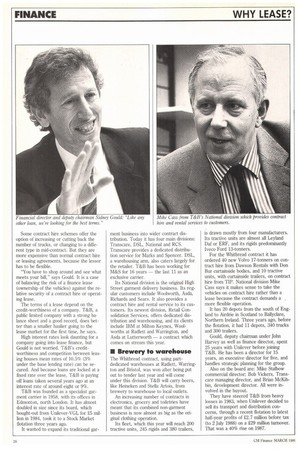Some contract hire schemes offer the option of increasing or
Page 140

If you've noticed an error in this article please click here to report it so we can fix it.
cutting back the number of trucks, or changing to a different type in mid-contract. But they are more expensive than normal contract hire or leasing agreements, because the lessor has to be flexible.
"You have to shop around and see what meets your bill," says Gould. It is a case of balancing the risk of a finance lease (ownership of the vehicles) against the relative security of a contract hire or operating lease.
The terms of a lease depend on the credit-worthiness of a company. T&B, a public limited company with a strong balance sheet and a good record, does better than a smaller haulier going to the lease market for the first time, he says.
High interest rates look daunting for a company going into lease finance, but Gould is not worried. T&B's creditworthiness and competition between leasing houses mean rates of 10.5% (3% under the base lending rate) can be secured. And because loans are locked at a fixed rate over the lease, T&B is paying off loans taken several years ago at an interest rate of around eight or 9%.
T&B was founded as a specialist garment carrier in 1958, with its offices in Edmonton, north London. It has almost doubled in size since its board, which bought-out from Unilever-VGL for £5 million in 1984, took it to a Stock Market flotation three years ago.
It wanted to expand its traditional gar ment business into wider contract distribution. Today it has four main divisions: Transcare, DSL, National and RCS. Transcare provides a dedicated distribution service for Marks and Spencer. DSL, a warehousing arm, also caters largely for the retailer. T&B has been working for M&S for 16 years — the last 11 as an exclusive carrier.
Its National division is the original High Street garment delivery business. Its regular customers include Woolworth, Asda, Richards and Sears. It also provides a contract hire and rental service to its customers. Its newest division, Retail Consolidation Services, offers dedicated distribution and warehousing, and its clients include IBM at Milton Keynes, Woolworths at Radlett and Warrington, and Asda at Lutterworth — a contract which comes on stream this year.
• Brewery to warehouse
The Whitbread contract, using partdedicated warehouses at Radlett, Warrington and Bristol, was won after being put out to tender last year and will come under this division. T&B will carry beers, like Heineken and Stella Artois, from brewery to warehouse to local outlets.
An increasing number of contracts in electronics, grocery and toiletries have meant that its combined non-garment business is now almost as big as the original clothing operation.
Its fleet, which this year will reach 200 tractive units, 245 rigids and 380 trailers, is drawn mostly from four manufacturers. Its tractive units are almost all Leyland Daf or ERF, and its rigids predominantly lveco Ford 13-tonners.
For the Whitbread contract it has ordered 40 new Volvo 17-tonners on contract hire from Dawson Rentals with Don Bur curtainside bodies, and 10 tractive units, with curtainside trailers, on contract hire from TIP. National division Mike Cass says it makes sense to take the vehicles on contract hire rather than a lease because the contract demands a more flexible operation.
It has 20 depots from the south of England to Airdrie in Scotland to Ballyclare, Northern Ireland. Three years ago, before the flotation, it had 11 depots, 340 trucks and 300 trailers.
Gould, deputy chairman under John Harvey as well as finance director, spent 25 years with Unilever before joining T&B. He has been a director for 15 years, an executive director for five, and handles strategic planning for the group.
Also on the board are: Mike Stalbow commercial director; Bob Vickers, Transcare managing director, and Brian McKibbin, development director. All were involved in the buyout.
They have steered T&B from heavy losses in 1983, when Unilever decided to sell its transport and distribution concerns, through a recent flotation to latest half-year profits of £2.7 million before tax (to 2 July 1988) on a £29 million turnover. That was a 40% rise on 1987.




















































































































































